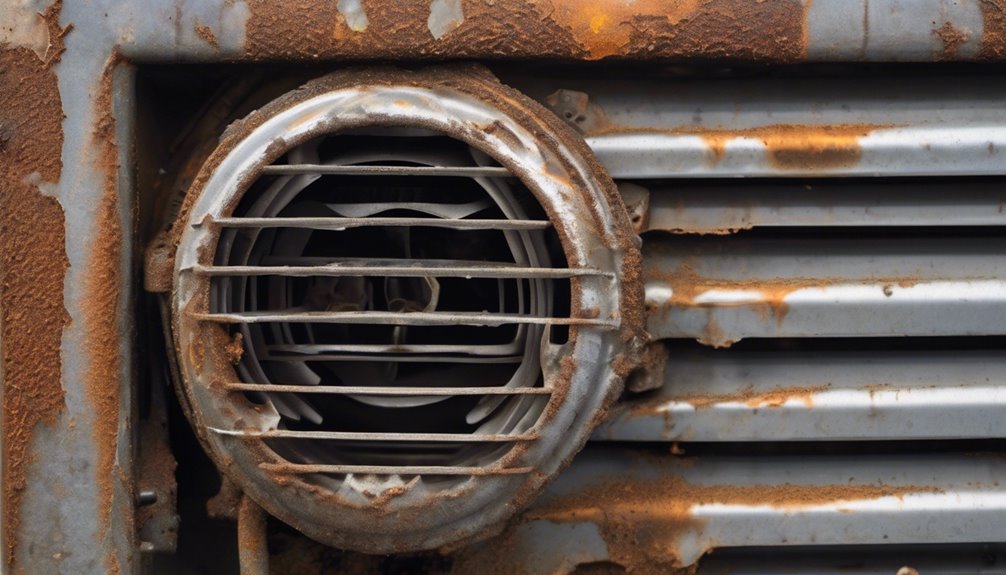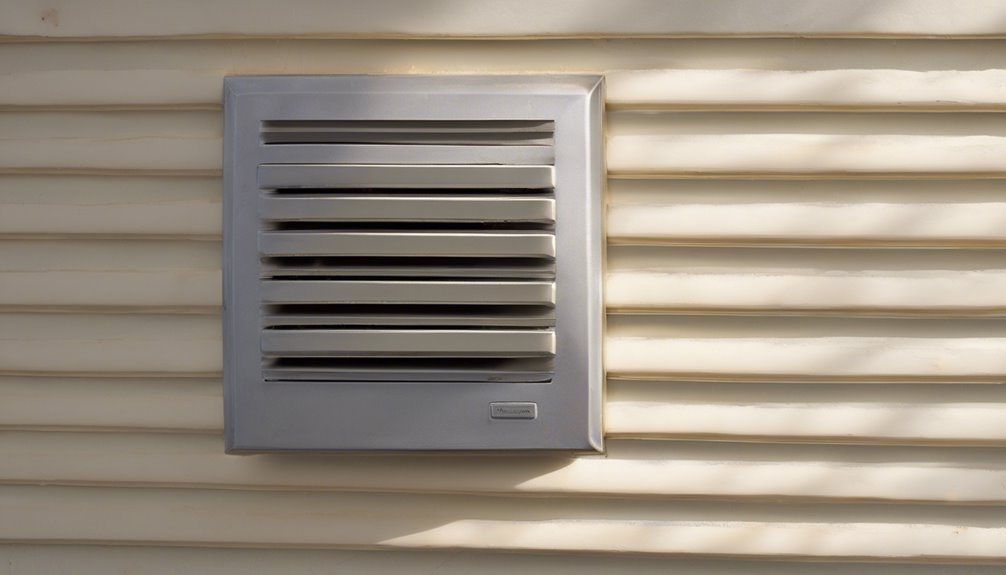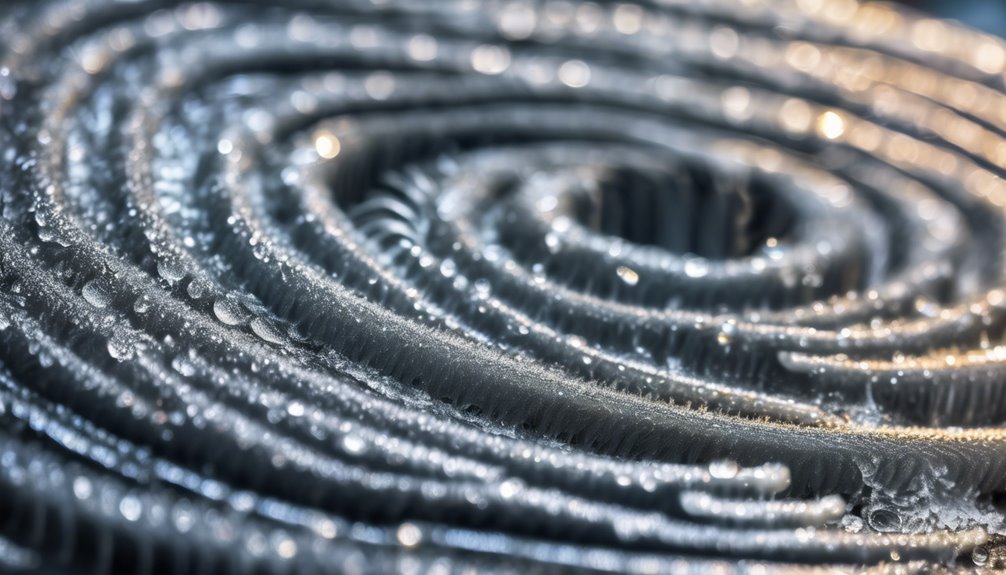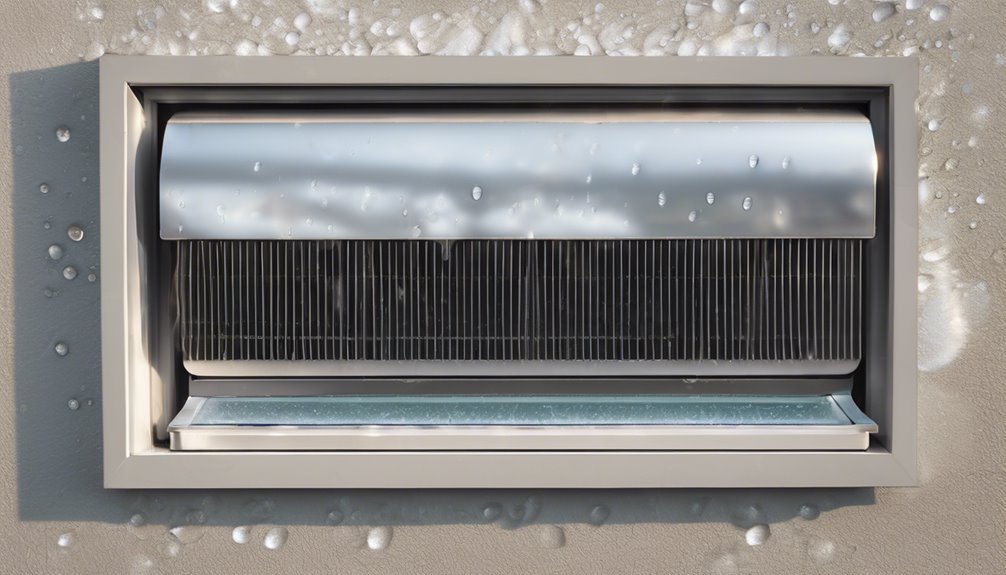Your AC compressor is overheating because one or more of five common issues – refrigerant leaks, airflow restrictions, thermostat malfunctions, installation flaws, and electrical component problems – are likely to blame, and neglecting to address them can lead to premature wear, inefficient cooling, and complete system failure. You might be wondering which one is causing the problem, and how you can fix it before it's too late – the answers to these questions could be just what you need to get your AC running smoothly again.
Key Takeaways
- Refrigerant leaks, low levels, or incorrect charging can cause AC compressor overheating, leading to premature wear and system failure.
- Dirty air filters, coils, or restricted airflow can increase the compressor's workload, generating excessive heat and reducing efficiency.
- Faulty thermostats can provide inaccurate temperature readings, causing the compressor to work harder and overheat, leading to increased energy bills.
- Insufficient clearance space, improper installation, or loose components can block airflow, create heat traps, and lead to overheating and malfunction.
- Electrical issues, such as faulty discharge valves, power surges, or shorts, can disrupt the compressor's operation, leading to overheating and potential system failure.
Refrigerant Leaks: A Common Culprit
Check your AC compressor for signs of refrigerant leaks, as they're a common cause of overheating.
You'll want to perform regular refrigerant checks to ensure everything's running smoothly. Look for oily residue, water spots, or ice buildup around the compressor, as these can indicate a leak.
If you suspect a leak, it's essential to act quickly, as refrigerant leaks can lead to serious damage and even system failure. Use a leak detection tool to identify the source of the leak and address it promptly.
Clogged Air Filters: A Filter's Fatal Flaw
A dirty air filter can be a silent killer of your AC compressor's efficiency, leading to overheating and a host of other problems. When your filter is clogged, it restricts airflow, causing your compressor to work harder and generate more heat. This can lead to premature wear and tear, increased energy bills, and even complete system failure.
| Filter Maintenance | Benefits |
|---|---|
| Regular filter cleaning | Reduces compressor workload, energy bills |
| Replacing filters every 1-3 months | Prevents overheating, prolongs compressor lifespan |
| Inspecting filters monthly | Identifies potential issues before they escalate |
Faulty Thermostats: When Temperature Control Fails
When your AC compressor overheats, a faulty thermostat might be the culprit.
You'll want to investigate how thermostats can fail, such as by providing inaccurate temperature readings or malfunctioning cooling cycles.
Thermostat Failure Modes
Thermostat failure can manifest in various ways, each with its own set of consequences for your AC compressor's performance and longevity.
If your thermostat is faulty, it may not be able to regulate the compressor's temperature accurately. This can cause overheating, leading to reduced efficiency and increased energy bills.
You may need to perform thermostat diagnostics to identify the issue. Check if the thermostat is properly calibrated; if not, it may be causing the compressor to work harder than necessary.
In some cases, a faulty thermostat may not turn off the compressor even when the desired temperature is reached, leading to continuous operation and overheating.
Inaccurate Temperature Readings
Your AC compressor relies on accurate temperature readings to function efficiently, but faulty thermostats can provide misleading information, causing the compressor to malfunction.
If your thermostat's sensor is miscalibrated, it can lead to inaccurate temperature readings. This can cause your compressor to work harder than necessary, leading to overheating.
Temperature fluctuations can also occur, making it difficult for your compressor to maintain a consistent temperature. As a result, your compressor may cycle on and off more frequently, increasing the risk of overheating.
To avoid this, ensure your thermostat's sensor is properly calibrated and functioning correctly.
Malfunctioning Cooling Cycles
Faulty thermostats can disrupt the cooling cycle, causing your AC compressor to overheat. When your thermostat malfunctions, it can't regulate the temperature correctly, leading to cooling failures and overheating patterns. This can cause your compressor to work harder, generating more heat and reducing its lifespan.
| Symptom | Effect on Cooling Cycle |
|---|---|
| Incorrect temperature readings | Compressor runs continuously, causing overheating |
| Faulty thermostat calibration | Cooling cycle doesn't turn off, leading to excessive heat buildup |
| Thermostat sensor malfunction | Compressor receives incorrect temperature signals, causing cooling failures |
| Thermostat failure to switch modes | Compressor remains in cooling mode, causing continuous heat generation |
Dirty Coils: The Hidden Menace
Dust, dirt, and debris accumulating on your AC compressor's coils can be a silent assassin, slowly strangling its performance and efficiency.
As debris accumulates, it blocks airflow, causing your compressor to work harder and generate more heat. This can lead to overheating, reduced cooling capacity, and increased energy bills.
Regular coil cleaning is essential to prevent this. Check your coils every month and clean them gently with a garden hose to remove dirt and debris.
Make sure to turn off the power before cleaning to avoid electrical shock. By keeping your coils clean, you'll ensure your AC compressor runs smoothly, efficiently, and at a lower risk of overheating.
Incorrect Installation: A Recipe for Disaster
When you install an AC compressor, you're not just slapping it together – you're setting it up for success or failure.
If you don't leave sufficient clearance space around the unit, you're blocking airflow and creating a heat trap.
And if you don't properly secure components, you're inviting vibrations that'll cause the whole system to malfunction.
Insufficient Clearance Space
You've likely heard the phrase "a recipe for disaster" before, but it's especially fitting when it comes to installing an AC compressor with insufficient clearance space.
When you don't leave enough room around the compressor, it can't breathe, leading to overheating. Space constraints and nearby obstructions can block airflow, causing the compressor to work harder and generating more heat.
This can lead to premature wear, reduced efficiency, and even complete system failure. Make sure to follow the manufacturer's installation guidelines and leave enough clearance space around the compressor to ensure proper airflow.
Failure to do so can result in a host of problems, including overheating, that'll leave you sweating in the summer heat.
Improperly Secured Components
Improper installation of AC compressor components can lead to a world of trouble, and one of the most critical mistakes is failing to secure them properly. If you didn't tighten screws, bolts, or wires enough, they can come loose over time, causing your compressor to overheat. Loose wires can short circuit, while worn bearings can grind to a halt, generating excessive heat.
| Common Issues | Consequences |
|---|---|
| Loose wires | Short circuits, overheating |
| Worn bearings | Excessive heat, compressor failure |
| Misaligned parts | Increased friction, overheating |
| Poorly secured fans | Reduced airflow, overheating |
Capacitor Issues: The Unseen Problem
One common culprit behind AC compressor overheating is a faulty capacitor, which can be hiding in plain sight.
A faulty capacitor, hiding in plain sight, can be the silent culprit behind your AC compressor overheating.
You mightn't think to check it, but capacitor wear and capacitor corrosion can cause your compressor to overheat. Over time, the capacitor's internal components can deteriorate, reducing its ability to regulate voltage.
Corrosion can also set in, further compromising the capacitor's performance. If you're not careful, this unseen problem can lead to compressor failure.
Check your capacitor for signs of wear or corrosion, and consider replacing it if you notice any issues. A faulty capacitor can be a silent killer of your AC compressor, so don't overlook it in your troubleshooting efforts.
High Pressure: When the System Gets Too Hot
High pressure in your AC system can be a recipe for disaster, causing your compressor to overheat and potentially leading to costly repairs or even complete system failure.
When your system's pressure gets too high, it can trigger your high pressure sensors, shutting down the compressor to prevent damage. However, if the sensors fail or are faulty, the compressor will continue to run, leading to overheating.
Another common culprit is faulty discharge valves, which can cause pressure to build up in the system. If you suspect high pressure is causing your compressor to overheat, it's essential to have a professional inspect and diagnose the issue to prevent further damage.
Low Refrigerant: The Cooling Consequences
Few things can wreak havoc on your AC compressor like low refrigerant levels, which can lead to overheating and a host of other cooling consequences.
When you're running low on refrigerant, the viscosity of the remaining liquid increases, causing your compressor to work harder to circulate it. This increased effort generates more heat, further exacerbating the problem.
As a result, your system becomes inefficient, using more energy to cool your space while producing less cooling power. If you neglect to address the issue, it can lead to premature wear on your compressor and even complete system failure.
It's crucial to identify and fix refrigerant leaks or undercharges to prevent these consequences and keep your AC running smoothly.
Electrical Issues: The Hidden Dangers
What's causing your AC compressor to overheat, besides low refrigerant levels?
Electrical issues can be the hidden culprits behind your AC compressor's overheating problem. These issues can be tricky to diagnose, but they're crucial to address to prevent further damage.
Some common electrical issues that can cause your AC compressor to overheat include:
- Power surges that exceed the compressor's voltage rating
- Electrical shorts that create excessive resistance and heat
- Faulty wiring or connections that disrupt the compressor's normal operation
If you suspect electrical issues are behind your AC compressor's overheating, it's essential to call a professional to inspect and repair your system. Don't risk further damage or even a complete system failure – address these hidden dangers today.
Frequently Asked Questions
Can I Fix an Overheating AC Compressor on My Own?
You can try fixing an overheating AC compressor yourself, but be cautious. Check compressor lubrication levels and ensure proper electrical connections. If issues persist, it's best to call a pro to avoid further damage or safety risks.
How Often Should I Clean My AC Coils to Prevent Overheating?
You should clean your AC coils every 1-3 months, depending on usage, to ensure efficient airflow and prevent overheating. Regular coil maintenance and seasonal checks will keep your system running smoothly and prolong its lifespan.
Will a Dirty AC Filter Cause My Compressor to Overheat?
You're wondering if a dirty AC filter can cause your compressor to overheat. Yes, it can! A dirty filter restricts airflow, reducing filter efficiency, which can lead to increased pressure and temperature, causing your compressor to overheat.
Can an Overheating Compressor Cause a Fire or Explosion?
You're right to worry: an overheating compressor can spark a fire or even explosion. Electrical sparks near flammable refrigerant or oil can ignite, and if you're not careful, you'll be facing a serious fire hazard, so take action to prevent it!
How Long Does It Take for an Overheating Compressor to Cause Damage?
You'll typically have a small window to address an overheating compressor before it causes damage. If temperatures exceed 150°F, you're looking at a shortened compressor lifespan. The longer you wait, the more likely you'll face costly repairs or even total compressor failure.
Conclusion
You've identified the possible reasons behind your AC compressor's overheating. Now it's time to take action. Check for refrigerant leaks, clean or replace clogged air filters, and inspect thermostats, coils, and capacitors for faults. Ensure proper installation and monitor pressure levels. If you're still unsure, it may be time to call a professional to diagnose and fix the issue before it leads to costly repairs or even complete system failure.



